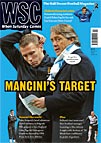 After only a handful of Liverpool appearances an error of judgement means the French goalkeeper is starting again. Ben Lyttleton reports
After only a handful of Liverpool appearances an error of judgement means the French goalkeeper is starting again. Ben Lyttleton reports
Perhaps the fact that Charles Itandje refused to answer his phone and briefly went into hiding when Liverpool first tried to buy him was a sign that he was destined never to succeed at Anfield. That was back in 2001. On the day of Liverpool’s amazing 5-4 UEFA Cup win over Alavés the goalkeeper was due to meet Gérard Houllier to discuss a move. “I had an appointment but I didn’t go,” Itandje remembered. “I almost pretended to be dead. I had just signed a pre-contract with Lens, where I was set to become number one, and I did not want to turn it down.”
Instead he stayed six years at Lens where his performances earned him a single cap for France Under-21s and a pre-selection for the senior squad. But coach Raymond Domenech was reportedly furious when Itandje talked up his chances of making France’s 2006 World Cup squad and he was never picked again. When the president of Lens, Gervais Martel, started selling off the team’s best players – Jérôme Leroy, closely followed by Olivier Thomert, Jussiê and Seydou Keita – Itandje could sense trouble ahead.
“The president started to do silly things and it was obvious there was a problem,” he said. Before Guy Roux took over in the summer of 2007, Itandje made himself available for transfer and there was no shortage of interest. “Lyon contacted me but I didn’t want to stay in France. I could have gone to Alavés in Spain and been the number one. But I didn’t choose the easy road. I preferred to go and win a spot at a big club. I wanted to put doubt in the mind of the coach.”
And so, six years after they first showed interest, Itandje was at Liverpool, marvelling at the skills of his new team-mates in training. (That next season Lens were relegated.) He accepted that he was behind Pepe Reina in the pecking order, but told friends that he expected to challenge the Spaniard for a place in the first team. No one could criticise his confidence, though his ability hardly shone through in his seven FA and League Cup appearances. He conceded ten goals in those games, three of which ended in results of varying embarrassment to the club: drawing 1-1 with Luton, twice coming from behind to beat Havant & Waterlooville 5-2 and then losing 2-1 to Barnsley.
Itandje turned down a move to Galatasaray in the summer of 2008 and, as he slipped to third-choice behind Diego Cavalieri, seemed to take the words of Stéphane Dalmat, another failed Premier League import, to heart. “Stéphane is my friend and he is the one that told me it’s not trophies that will get me served in the supermarket when I go shopping in ten years.”
Then, on April 15 last year, came the Hillsborough ceremony at Anfield to commemorate the tragedy’s 20th anniversary. Itandje was caught on camera joking in conversation with a team-mate and everything changed.He apologised straightaway but the club were unforgiving, suspending him for 14 days. “I never intended to offend anyone,” he said. “My behaviour was clumsy and awkward, but I am disappointed that the club did not support me. The club told me: ‘Don’t even walk in the street or you will be attacked.’” The stress of that period caused an attack of eczema on his hands and he knew his days were numbered. “I had to leave England.”
The offers that once flooded in were nowhere to be found and Itandje was dispatched to Kavala in Greece, who had just won promotion to the top flight for the first time in ten years. “Everything is different here, for a start there is no training centre at the club, but I am playing every week and the pace of life is good.”
Itandje’s integration has been helped by an enclave of ex-Ligue 1 players – including Frédéric Mendy, Wilson Oruma and Pierre Ducrocq – also at the club. His spare time is spent fishing on a boat drifting in the Black Sea or as he puts it: “Every day is like a little holiday here.”
He remains under contract at Liverpool but will be sold at the end of the season. A good campaign in Greece could lead to a permanent deal with a big club there or a return to Ligue 1. At only 26, it is not too late for him to succeed, but not if he takes the Dalmat approach to professional football.
From WSC 276 February 2010